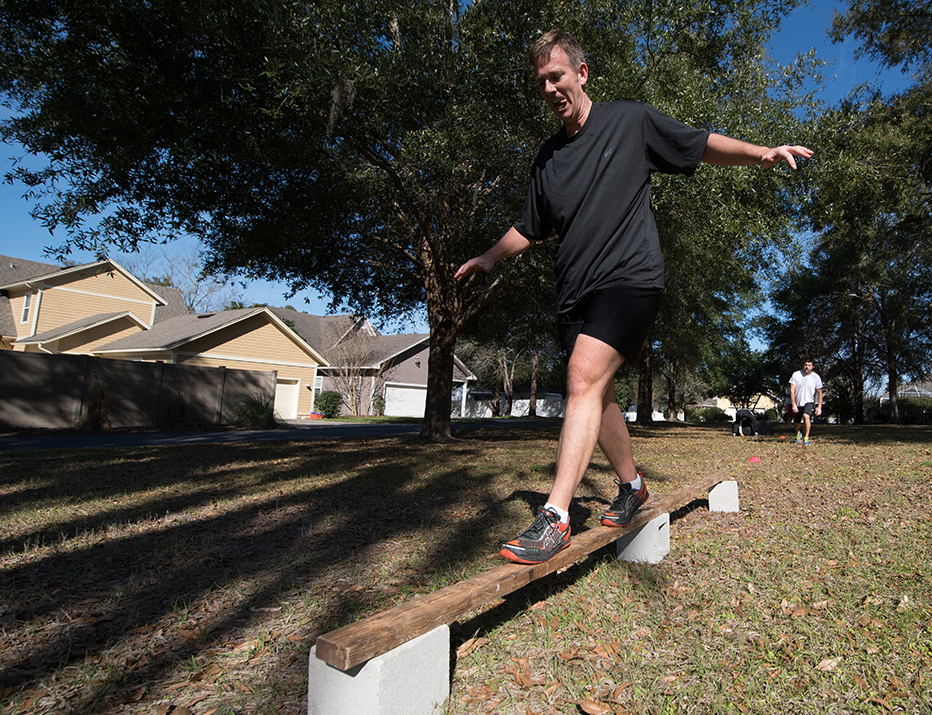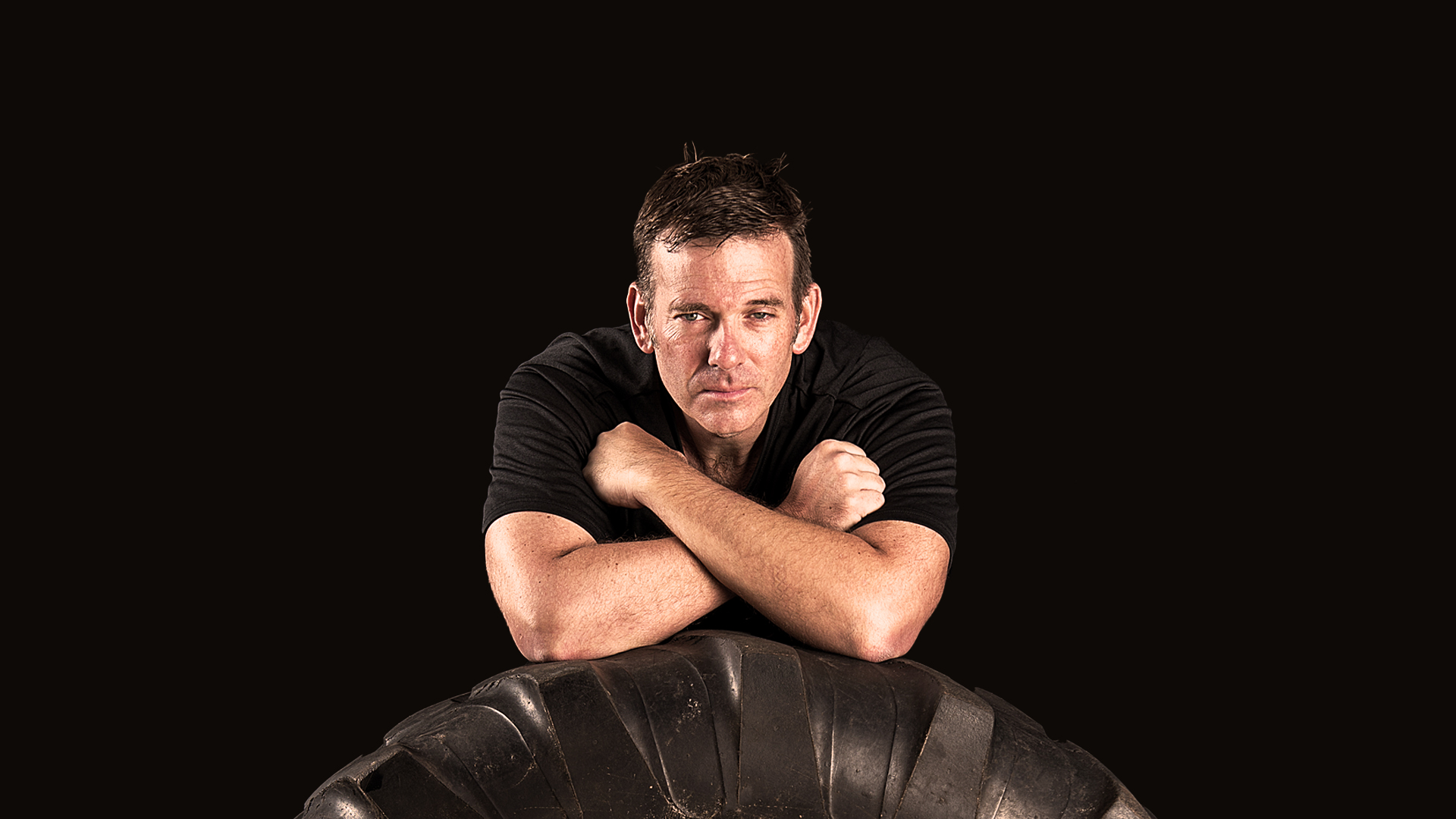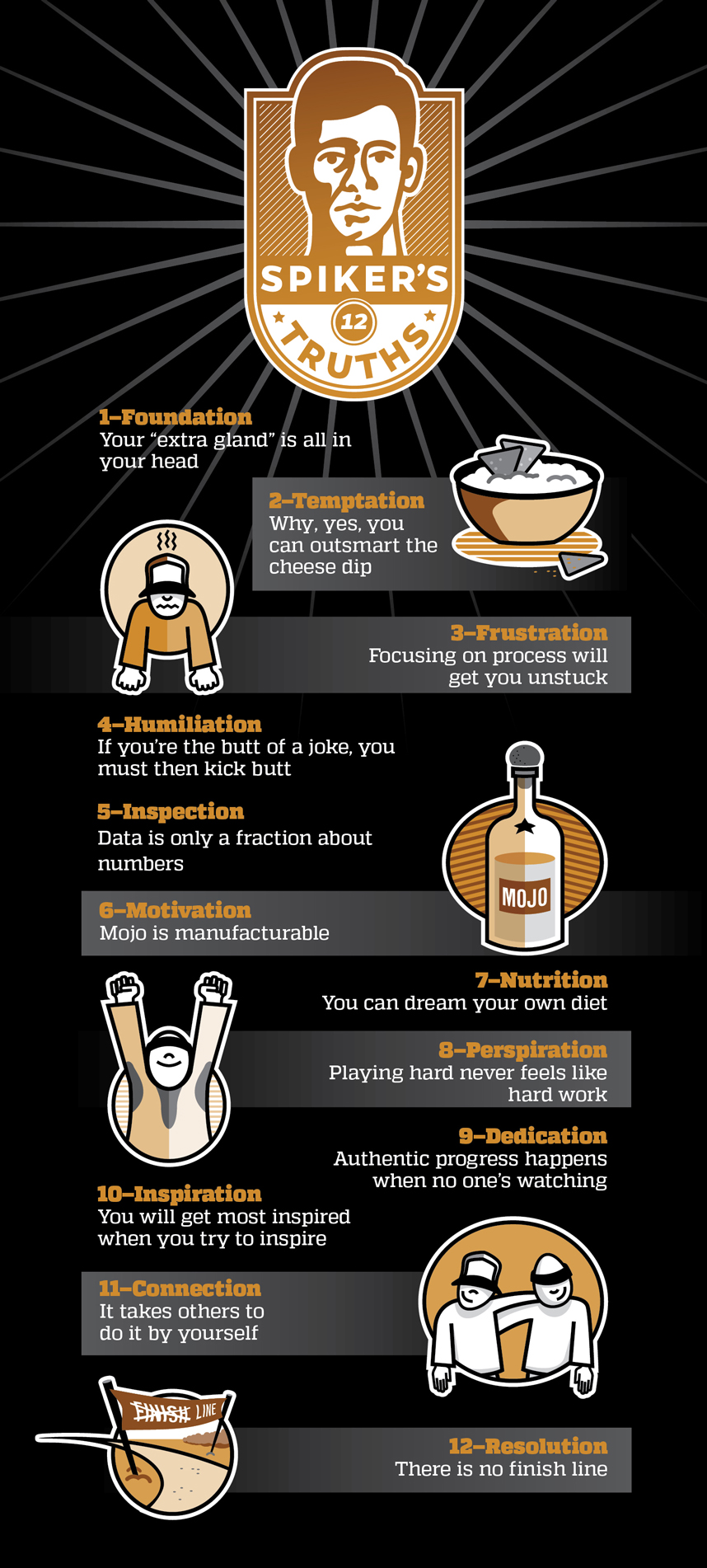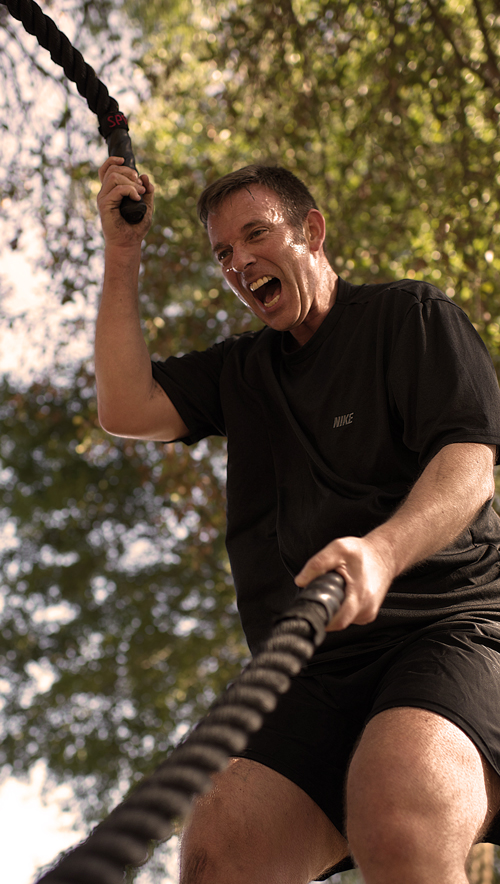In the world of weight loss and fitness, numbers rule: 279 pounds; 20,000 pushups; 75 miles; a 6:22 marathon; a 16:39:53 Ironman; a 750-pound truck tire; the No. 6 at the drive-thru; a 76-ounce steak.
One number ought to be fair game for a chat with the author of Down Size: 12 Truths for Turning Pants-Splitting Frustration into Pants-Fitting Success, so …
“What did you weigh when you stepped on the scale this morning?”
Ted Spiker, University of Florida journalism professor and noted health and fitness author, smiles serenely.
“I haven’t weighed myself in nine months,” Spiker says. “I just kind of stopped, and I try not to be so wrapped up in that number.”
This from a guy who pokes fun at himself on the Big Guy Blog in Runner’s World and who ate that 76-ounce steak, with fries and ice cream, for a magazine story in Men’s Health. In Down Size, he talks about growing up thinking he had an extra gland that caused him to pack pounds on his hips, and gym class humiliations that almost everyone can relate to but no one wants to talk about.
So what are these weight loss truths that have caused him to break up with his scale?
In a book that bridges the gap between the prescriptive — eat this, don’t eat that — and the memoir — I lost 100 pounds and changed my life – Spiker reports on weight loss and fitness, using dozens of sports psychologists, trainers, physicians and nutritionists for the science. He delivers his insight, too, in a funny, self-deprecating style, and the book is almost an adventure in weight loss and fitness with a side of fries. He is vulnerable but makes it clear that he “owns” his weight. He’s hard on himself, but his tone to readers is gentle; the book is an empathetic nudge in the direction of good health for weary weight-loss warriors.
“For so long, I put so much stock in that number on the scale, that I’ve realized that can’t be what it’s about,” says Spiker, who guesses he is in the low 200s, which he carries well on his 6-foot-2 frame. “For me, for society as a whole, for people trying to lose weight, that number is devilish.
“I want to win the day, win the week and try to think of health more holistically,” Spiker says.
Although numbers are part of goal-setting, Spiker’s 12 truths (see list) are heavily seasoned with the concept of “feel.” Whether we are overweight or just have body image issues, we need to stop beating ourselves up in our pursuit of good health.
He details his lifelong affair with food and his top 10, which always features meat and potatoes but currently includes cheese grits.
“I never really had them until recently; oh my gosh, cheese grits are really good,” Spiker says.
Followers tease him on Twitter about pancakes because of a story he wrote for Runner’s World. He likes chicken, and on occasion will ask his wife to get him his own rotisserie chicken for dinner, and he makes it a meal with a little sriracha. For him, cutting carbohydrates and sugar helps with weight loss, but he says he likes his carbs too much to go completely carb-free.
His land mines are clear from the mouth-watering smorgasbord that appears in the book: bacon cheeseburgers, tacos, peanut butter cups, icy coffee drinks, pretzel rolls, snickerdoodles, Cherry Garcia ice cream, cake-batter-flavored coffee creamer, Fudgsicles, banana pudding, barbecue chips, Easter candy, ravioli, cinnamon buns, lasagna, S’Mores Blizzards. He uses humor – “I want to have my cake, and eat yours, too” — to make the point that food issues are anything but easy.
As a society, we need to come to grips with the role of food and stop thinking, “We’re going to beat the pepperoni out of the obesity epidemic with a fifty-pound bag of carrots,” Spiker writes.
The Food Dilemma
Our food environment is challenging. Smoking declined in popularity because the environment changed for smokers. Food is trickier. Food is still cool, and we all eat, so changing the environment for food will take a huge buy-in beyond what anti-smoking campaigns saw. For foodies, the question Spiker poses — Do we stand a chance against chicken parm sandwiches? — is downright existential.
Food also comes with family and friends attached. For Spiker, his wife’s Thanksgiving meal is his favorite food memory, not just because it’s so delicious but because the family goes with the food. Still, every occasion cannot be a special occasion.
“I cannot remember a time …” he trails off, and begins again, “It’s very hard for me to have an indulgent meal and not have guilt with it.” As he writes in Down Size: “Food is part of who I am. I eat fast. I eat a lot.”
His gusto for food is matched by his passion for exercise, particularly a challenge. Spiker says he’s not big on New Year’s resolutions, but likes to have a goal each year. In 2013, it was the Ironman, the most elite of endurance events, with a 2.4-mile swim, 112-mile bike ride, and a 26.2-mile run. Racers who finish the three legs with a time higher than 17 hours are listed as DNF, Did Not Finish, their effort not even recorded. Spiker’s goal was to beat 17 hours.
In a road race, nobody hangs around to watch the last runners. But at the Ironman, the 17th hour ticking to a close, Spiker high-fived his way the last half-mile to the finish line, with a time of 16:39:53.
“I was passing people who had their medals on, they had already showered and napped and eaten, literally probably finished six hours beforehand, and they’re out there cheering you on,” Spiker says.
“It was almost like the weight was gone. I did it. No matter how fast or slow I am, or how much I gain or lose, I have that.”

Spiker says the great part about an Ironman is there’s zero judgment on your time. He was downplaying his time — “I’d hardly call it a race” — in a conversation with a friend, when the friend said to him, “You know what they call the person who finished last in medical school? Doctor. It’s OK, you’re still an Ironman.”
The cachet of the Ironman label has traveled with him as well. In party conversation, a woman said in passing, “Well, you’re an elite athlete.”
“I almost spit my drink out,” Spiker says. “That’s the furthest thing from what I am. It’s interesting to see people’s perceptions of you, when you’ve had other perceptions for 40-some years about how you are.”
Those perceptions come through in Down Size, the story fluctuating between vulnerable and gutsy. The guy picked last for basketball, who got a D in gym class, runs the New York City marathon, an Ironman and a Tough Mudder. A reader can hope that exorcises the demons of the Presidential Physical Fitness Test. He’s explored for himself the line between reasons and excuses and urges readers to do so, too.
Spiker says he’s felt supported on his weight loss and fitness quests, and he likes to pay that forward. He first started hearing from atypical runners when he started the Big Guy Blog for Runner’s World. Even people without weight issues would write in and say, “You kind of represent misfits in a way.” He started a Facebook group for runners trying to break 30 minutes on a 5K race, thinking he might be the only one, but the Sub-30 Club page now has 3,000 members. The number is the goal, but it comes with encouragement.
“It’s an amazing community. We all know what it’s like not to fit in,” Spiker says. “But the spirit of the people, it’s crazy how they all are supportive of each other.”
When one member was struggling with her 5K time, Spiker decided to attend her next race, although he’d never met her in person. He managed to pick her out of the crowd, and, “She was coming up the last tenth of a mile, and I see the time, and it’s clear she’s going to get it, and I yelled her name, ‘You got it, you got it, you’re crushing it!’”
She was shocked to see him and even more shocked that he had shown up specifically to see her get her sub-30 time.
“The look on her face, that I came out to cheer her on … It wasn’t a hard thing for me to do, but she said that it meant something for me to do that, and that’s important.”
That’s the connection he wants to forge with his readers. One woman described Down Size as “motivation for the imperfect person.”
Another reader, an acquaintance he’d fallen out of touch with, called and asked to have lunch after reading it. He was struggling with some personal issues, not weight loss, but the book resonated so much that he began to cry. He was open enough, Spiker says, to see the connections between emotions and food.
Breaking News
In 2014, Spiker started the year using a spread sheet to track his goals: 20,000 pushups, 75 miles swimming, 1,000 miles running, 1,500 miles biking, 25 tire-flipping workouts, 1,500 minutes of stretching, 30,000 seconds in plank position, 1 unassisted pull-up. Then along came a curveball.
“This is reality,” Spiker says. “Life gets in the way.”
The rejiggering of fitness goals aside, this curveball is welcome. Spiker became the chair of the Department of Journalism in the College of Journalism and Communications, an exciting opportunity at a time when the field needs leadership.
He loves teaching, and students love him if his reviews on Rate My Professor are any indication: “Spiker rocks!” and “Best teacher at UF.” One student wrote, “ … some might say he is kind of hot,” a nice boost for body image. He even has a red chili pepper, although his isn’t on fire like another colleague’s.
In his capstone magazine class, he sometimes uses audio files to give feedback, and in his packed Sports Media & Society class, he brings in speakers to explore the complicated role of sports in the world today.
“In my magazine and book stuff I can hopefully reach a bigger audience, but I don’t get a ton of feedback,” Spiker says. “With teaching, I have a small audience in a lot of cases, and you can really help somebody one on one, and steer them in a way that affects their lives.”
In the new position, “I want to take the things I’ve learned and help people get where they want to go, students and faculty. This job is going to be about ideas, it’s going to be about the big picture.”
The hand-wringing over the death of his craft misses the point, he says: Journalism is evolving. It’s no longer just newspapers or the evening news, but “…everything from those things to online platforms to magazine style to tweets to citizen journalism to storytelling within corporations.”
Spiker embraces the post-traditional platforms — Facebook, Twitter, YouTube, and others. When UF removed a brick commemorating former Gator tight end Aaron Hernandez after he was charged with murder while in the NFL, Spiker happened to be walking by. Journalism juices flowing, he took a photo of the brick and tweeted it out.
“I said to myself this is a significant moment, a national moment, and I’m right here,” Spiker says. “That’s the advantage of social media, we’re all reporters.”
Spiker also took to Twitter when he got a jaywalking ticket for crossing a side street in a crosswalk against a red signal.
“I was livid,” Spiker says. “I was careful, I looked both ways, it was a side street, nothing was coming, and I got pulled over on foot.
“This is the point of social media, you have a voice when you feel like you’ve been wronged. That’s really what journalism can be about, so social media can be an extension of that.”
In the spirit of journalistic fairness — if you rip somebody, you have to give him a chance to respond — he tagged Gainesville Police. To his surprise and GPD’s credit, he says, they engaged (he still had to pay the ticket).
While he acknowledges that the market is nearly saturated for health and diet books, he felt there was room for Down Size. “If we have all these diet books, and we’re still an overweight society, then obviously something is missing,” Spiker says.
The quick fixes might work for “two weeks, or two months, but how do you sustain it?” Spiker asks. “We all want the quick prescription, just do this and everything will work out. The reality, as we all know, is it’s not that easy.”
“That’s probably one of the reasons I haven’t weighed myself. When I was training for the Ironman, I felt strong. I wasn’t the lowest weight I’ve ever been, but I felt strong, and I felt good, and I felt like I was achieving something, and I felt like I had the support of a huge network of people, not just in person but online,” Spiker says. “I feel good. So what does that number in the scale mean?”
Source:
- Ted Spiker, Associate Professor of Journalism
Related Website:
This article was originally featured in the Spring 2015 issue of Explore Magazine.



